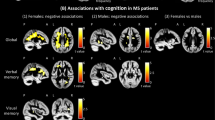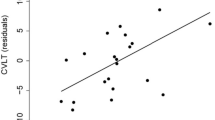Abstract
Background
Although there is evidence that shows worse cognitive functioning in male patients with multiple sclerosis (MS), the role of brain pathology in this context is under-investigated.
Objective
To investigate sex differences in cognitive performance of MS patients, in the context of brain pathology and disease burden.
Methods
Brain MRI, neurological examination, neuropsychological assessment (Brief International Cognitive Assessment in MS—BICAMS, and Paced Auditory Verbal Learning Test—PASAT), and patient-reported outcome questionnaires were performed/administered in 1052 MS patients.
Results
Females had higher raw scores in the Symbol Digit Modalities Test (SDMT) (57.0 vs. 54.0; p < 0.001) and Categorical Verbal Learning Test (CVLT) (63.0 vs. 57.0; p < 0.001), but paradoxically, females evaluated their cognitive performance by MS Neuropsychological Questionnaire as being worse (16.6 vs 14.5, p = 0.004). Females had a trend for a weaker negative correlation between T2 lesion volume and SDMT (\(\rho\) = – 0.37 in females vs. – 0.46 in men; interaction p = 0.038). On the other hand, women had a trend for a stronger correlation between Brain Parenchymal Fraction (BPF) and a visual memory test (Spearman’s \(\rho\) = 0.31 vs. 0.21; interaction p = 0.016). All these trends were not significant after correction for false discovery rate.
Conclusions
Although, females consider their cognition as worse, males had at a group level slightly worse verbal memory and information processing speed. However, the sex differences in cognitive performance were smaller than the variability of scores within the same sex group. Brain MRI measures did not explain the sex differences in cognitive performance among MS patients.


Similar content being viewed by others
References
Benedict RHB, Amato MP, DeLuca J, Geurts JJG (2020) Cognitive impairment in multiple sclerosis: clinical management, MRI, and therapeutic avenues. The Lancet Neurology 19(10):860–871. https://doi.org/10.1016/s1474-4422(20)30277-5
Rao SM, Leo GJ, Bernardin L, Unverzagt F (1991) Cognitive dysfunction in multiple sclerosis. I. Frequency, patterns, and prediction. Neurology 41 (5):685–691. doi:https://doi.org/10.1212/wnl.41.5.685
Rao SM (1990) A manual for the brief repeatable battery of neuropsychological tests in multiple sclerosis. National Multiple Sclerosis Society, New York
Benedict RHB, Cookfair D, Gavett R, Gunther M, Munschauer F, Garg N, Weinstock-Guttman B (2006) Validity of the minimal assessment of cognitive function in multiple sclerosis (MACFIMS). J Int Neuropsycholog Soc. https://doi.org/10.1017/s1355617706060723
Benedict RH, Amato MP, Boringa J, Brochet B, Foley F, Fredrikson S, Hamalainen P, Hartung H, Krupp L, Penner I, Reder AT, Langdon D (2012) Brief International Cognitive Assessment for MS (BICAMS): international standards for validation. BMC Neurol 12:55. https://doi.org/10.1186/1471-2377-12-55
Langdon DW, Amato MP, Boringa J, Brochet B, Foley F, Fredrikson S, Hamalainen P, Hartung HP, Krupp L, Penner IK, Reder AT, Benedict RH (2012) Recommendations for a Brief International Cognitive Assessment for Multiple Sclerosis (BICAMS). Mult Scler 18(6):891–898. https://doi.org/10.1177/1352458511431076
Benedict RH, Zivadinov R (2011) Risk factors for and management of cognitive dysfunction in multiple sclerosis. Nat Rev Neurol 7(6):332–342. https://doi.org/10.1038/nrneurol.2011.61
Sumowski JF, Benedict R, Enzinger C, Filippi M, Geurts JJ, Hamalainen P, Hulst H, Inglese M, Leavitt VM, Rocca MA, Rosti-Otajarvi EM, Rao S (2018) Cognition in multiple sclerosis: state of the field and priorities for the future. Neurology 90(6):278–288. https://doi.org/10.1212/WNL.0000000000004977
Jorm A, Anstey K, Christensen H, Rodgers B (2004) Gender differences in cognitive abilities: the mediating role of health state and health habits. Intelligence 32:7–23. https://doi.org/10.1016/j.intell.2003.08.001
Roivainen E (2011) Gender differences in processing speed: a review of recent research. Learn Individ Differ 21:145–149. https://doi.org/10.1016/j.lindif.2010.11.021
Lezak MD, Howieson DB, Bigler ED, Tranel D (2012) Neuropsychological assessment, 5th edn. Oxford University Press, New York
Strober LB, Bruce JM, Arnett PA, Alschuler KN, Lebkuecher A, Di Benedetto M, Cozart J, Thelen J, Guty E, Roman C (2020) A new look at an old test: Normative data of the symbol digit modalities test –Oral version. Multiple Sclerosis and Related Disorders 43:102154. https://doi.org/10.1016/j.msard.2020.102154
Goretti B, Niccolai C, Hakiki B, Sturchio A, Falautano M, Minacapelli E, Martinelli V, Incerti C, Nocentini U, Murgia M, Fenu G, Cocco E, Marrosu MG, Garofalo E, Ambra FI, Maddestra M, Consalvo M, Viterbo RG, Trojano M, Losignore NA, Zimatore GB, Pietrolongo E, Lugaresi A, Langdon D, Portaccio E, Amato MP (2014) The Brief International Cognitive Assessment for Multiple Sclerosis (BICAMS): normative values with gender, age and education corrections in the Italian population. BMC Neurol 14:171. https://doi.org/10.1186/s12883-014-0171-6
Voskuhl RR, Patel K, Paul F, Gold SM, Scheel M, Kuchling J, Cooper G, Asseyer S, Chien C, Brandt AU, Meyer CE, Mackenzie-Graham A (2020) Sex differences in brain atrophy in multiple sclerosis. Biol Sex Differ. https://doi.org/10.1186/s13293-020-00326-3
Voskuhl RR (2020) The effect of sex on multiple sclerosis risk and disease progression. Mult Scler J 26(5):554–560. https://doi.org/10.1177/1352458519892491
Gilli F, DiSano KD, Pachner AR (2020) SeXX matters in multiple sclerosis. Front Neurol. https://doi.org/10.3389/fneur.2020.00616
Koch M, Kingwell E, Rieckmann P, Tremlett H (2010) The natural history of secondary progressive multiple sclerosis. J Neurol Neurosurg Psychiatry 81(9):1039–1043. https://doi.org/10.1136/jnnp.2010.208173
Savettieri G, Messina D, Andreoli V, Bonavita S, Caltagirone C, Cittadella R, Farina D, Fazio MC, Girlanda P, Le Pira F, Liguori M, Lugaresi A, Nocentini U, Reggio A, Salemi G, Tedeschi G, Trojano M, Valentino P, Quattrone A (2004) Gender-related effect of clinical and genetic variables on the cognitive impairment in multiple sclerosis. J Neurol 251(10):1208–1214. https://doi.org/10.1007/s00415-004-0508-y
Amato MP, Portaccio E, Goretti B, Zipoli V, Ricchiuti L, De Caro MF, Patti F, Vecchio R, Sorbi S, Trojano M (2006) The Rao’s Brief Repeatable Battery and Stroop Test: normative values with age, education and gender corrections in an Italian population. Mult Scler 12(6):787–793. https://doi.org/10.1177/1352458506070933
Beatty WW, Aupperle RL (2002) Sex differences in cognitive impairment in multiple sclerosis. Clin Neuropsychol 16(4):472–480. https://doi.org/10.1076/clin.16.4.472.13904
Schoonheim MM, Popescu V, Rueda Lopes FC, Wiebenga OT, Vrenken H, Douw L, Polman CH, Geurts JJG, Barkhof F (2012) Subcortical atrophy and cognition: sex effects in multiple sclerosis. Neurology 79(17):1754–1761. https://doi.org/10.1212/wnl.0b013e3182703f46
Schoonheim MM, Vigeveno RM, Lopes FCR, Pouwels PJW, Polman CH, Barkhof F, Geurts JJG (2014) Sex-specific extent and severity of white matter damage in multiple sclerosis: implications for cognitive decline. Hum Brain Mapp 35(5):2348–2358. https://doi.org/10.1002/hbm.22332
Uher T, Krasensky J, Vaneckova M, Sobisek L, Seidl Z, Havrdova E, Bergsland N, Dwyer MG, Horakova D, Zivadinov R (2017) A novel semiautomated pipeline to measure brain atrophy and lesion burden in multiple sclerosis: a long-term comparative study. J Neuroimaging 27(6):620–629. https://doi.org/10.1111/jon.12445
Uher T, Krasensky J, Sobisek L, Blahova Dusankova J, Seidl Z, Kubala Havrdova E, Sormani MP, Horakova D, Kalincik T, Vaneckova M (2018) Cognitive clinico-radiological paradox in early stages of multiple sclerosis. Ann Clin Transl Neurol 5(1):81–91. https://doi.org/10.1002/acn3.512
Uher T, Vaneckova M, Sormani MP, Krasensky J, Sobisek L, Dusankova JB, Seidl Z, Havrdova E, Kalincik T, Benedict RH, Horakova D (2017) Identification of multiple sclerosis patients at highest risk of cognitive impairment using an integrated brain magnetic resonance imaging assessment approach. Eur J Neurol 24(2):292–301. https://doi.org/10.1111/ene.13200
Dusankova JB, Kalincik T, Havrdova E, Benedict RH (2012) Cross cultural validation of the Minimal Assessment of Cognitive Function in Multiple Sclerosis (MACFIMS) and the Brief International Cognitive Assessment for Multiple Sclerosis (BICAMS). Clin Neuropsychol 26(7):1186–1200. https://doi.org/10.1080/13854046.2012.725101
Smith A (1982) Symbol Digit Modalities Test (SDMT): Manual. Western Psychological Services, Los Angeles
Bezdíček O, Preiss M (2009) Kalifornský test verbálního učení – druhé vydání: Psychometrická analýza českého převodu. Československá psychologie LIII 6:573–586
Benedict R (1997) Brief visuospatial memory test—revised: professional manual. Psychological Assessment Resources Inc, Odessa
Beck AT, Steer RA, Carbin MG (1988) Psychometric properties of the Beck Depression Inventory: twenty-five years of evaluation. Clin Psychol Rev 8(1):77–100. https://doi.org/10.1016/0272-7358(88)90050-5
Benedict RH, Munschauer F, Linn R, Miller C, Murphy E, Foley F, Jacobs L (2003) Screening for multiple sclerosis cognitive impairment using a self-administered 15-item questionnaire. Mult Scler J 9(1):95–101. https://doi.org/10.1191/1352458503ms861oa
R Core Team (2022) R: A language and environment for statistical computing. 4.2.2. edn. R Foundation for Statistical Computing, Vienna, Austria
IBM Corp. (2013) IBM SPSS Statistics for Windows. 22.0 edn. Armonk, NY
Barro C, Benkert P, Disanto G, Tsagkas C, Amann M, Naegelin Y, Leppert D, Gobbi C, Granziera C, Yaldizli O, Michalak Z, Wuerfel J, Kappos L, Parmar K, Kuhle J (2018) Serum neurofilament as a predictor of disease worsening and brain and spinal cord atrophy in multiple sclerosis. Brain 141(8):2382–2391. https://doi.org/10.1093/brain/awy154
Cohen J (1988) Statistical power analysis for the behavioral sciences, 2nd edn. Lawrence Erlbaum Associates, New Jersey
Strober LB, Bruce JM, Arnett PA, Alschuler KN, Lebkuecher A, Di Benedetto M, Cozart J, Thelen J, Guty E, Roman C (2020) A new look at an old test: normative data of the symbol digit modalities test-oral version. Mult Scler Relat Disord 43:102154. https://doi.org/10.1016/j.msard.2020.102154
D’Hooghe MB, De Cock A, Van Remoortel A, Benedict RHB, Eelen P, Peeters E, D’Haeseleer M, De Keyser J, Nagels G (2020) Correlations of health status indicators with perceived neuropsychological impairment and cognitive processing speed in multiple sclerosis. Multiple Scler Related Disord 39:101904. https://doi.org/10.1016/j.msard.2019.101904
O’Brien A, Gaudino-Goering E, Shawaryn M, Komaroff E, Moore NB, DeLuca J (2007) Relationship of the Multiple Sclerosis Neuropsychological Questionnaire (MSNQ) to functional, emotional, and neuropsychological outcomes. Arch Clin Neuropsychol 22(8):933–948. https://doi.org/10.1016/j.acn.2007.07.002
Kinsinger SW, Lattie E, Mohr DC (2010) Relationship between depression, fatigue, subjective cognitive impairment, and objective neuropsychological functioning in patients with multiple sclerosis. Neuropsychology 24(5):573–580. https://doi.org/10.1037/a0019222
Funding
This work was supported by the institutional support of the hospital research [RVO VFN 64165], Czech Ministry of Education [project Cooperation LF1, research area Neuroscience], The project National Institute for Neurological Research—funded by the European Union—Next Generation EU [Programme EXCELES, ID project No LX22NPO5107], Czech Ministry of Health project [grant number NU22-04-00193], the Charles University Grant Agency (GAUK) [grant number 1154218].
Author information
Authors and Affiliations
Corresponding author
Ethics declarations
Conflict of Interest
J.M. received compensation for travel, conference fees, and speaker honoraria from Sanofi Genzyme, Biogen, Novartis, and Merck. L.F. received compensation for travel, conference fees, and speaker honoraria from Biogen and Roche. RG, TF and JBD have nothing to declare. MV received speaker honoraria and consultant fees from Biogen Idec, Novartis, Merck Serono, and Teva, as well as support for research activities from Biogen Idec. JK received financial support for research activities from Biogen Idec. EKH received speaker honoraria and consultant fees from Biogen Idec, Merck Serono, Novartis, Genzyme, Teva, Actelion, and Receptos, as well as support for research activities from Biogen Idec and Merck Serono. DH received compensation for travel, speaker honoraria and consultant fees from Biogen Idec, Novartis, Merck Serono, Bayer Shering, and Teva, as well as support for research activities from Biogen Idec. TU received financial support for conference travel and honoraria from Biogen Idec, Novartis, Roche, Genzyme, and Merck Serono, as well as support for research activities from Biogen Idec and Sanofi.
Additional information
Publisher's Note
Springer Nature remains neutral with regard to jurisdictional claims in published maps and institutional affiliations.
Rights and permissions
Springer Nature or its licensor (e.g. a society or other partner) holds exclusive rights to this article under a publishing agreement with the author(s) or other rightsholder(s); author self-archiving of the accepted manuscript version of this article is solely governed by the terms of such publishing agreement and applicable law.
About this article
Cite this article
Motyl, J., Friedova, L., Ganapathy Subramanian, R. et al. Brain MRI disease burden and sex differences in cognitive performance of patients with multiple sclerosis. Acta Neurol Belg 124, 109–118 (2024). https://doi.org/10.1007/s13760-023-02350-7
Received:
Accepted:
Published:
Issue Date:
DOI: https://doi.org/10.1007/s13760-023-02350-7




